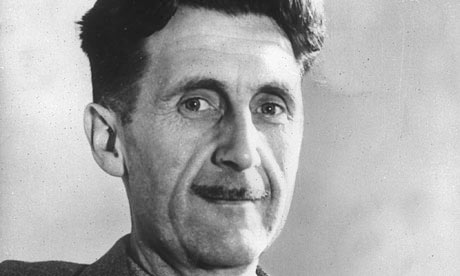George Orwell, fictitious name of Eric Arthur Blair was born on 25 June 1903, in Motihari, Bihar, in British India.His great-grandfather Charles Blair was a wealthy country gentleman in Dorset who married Lady Mary Fane, daughter of Thomas Fane, 8th Earl of Westmorland, and had income as an absentee landlord of plantations in Jamaica.
His father, Richard Walmesley Blair, worked in the Opium Department of the Indian Civil Service. His mother, Ida Mabel Blair (née Limouzin), grew up in Moulmein, Burma, where her French father was involved in speculative ventures.
The family moved to Shiplake before the First World War, where Eric became friendly with the Buddicom family, especially their daughter Jacintha. When they first met, he was standing on his head in a field. On being asked why, he said, “You are noticed more if you stand on your head than if you are right way up.
Orwell was sent to boarding school. In 1911 he went to St. Cyprian’s in the coastal town of Eastbourne, where he got his first taste of England’s class system. On a partial scholarship, Orwell noticed that the school treated the richer students better than the poorer ones.
He wasn’t popular with his peers, and in books he found comfort from his difficult situation.After completing his schooling at Eton, Orwell found himself at a dead end. His family did not have the money to pay for a university education. Instead he joined the India Imperial Police Force in 1922.
In 1937, Orwell travelled to Spain, where he joined one of the groups fighting against General Francisco Franco in the Spanish Civil War. Orwell was badly injured during his time with a militia, getting shot in the throat and arm. For several weeks, he was unable to speak. Orwell and his wife, Eileen, were indicted on treason charges in Spain. Fortunately, the charges were brought after the couple had left the country.
Later, in May 1937, after having fought in Barcelona against communists who were trying to suppress their political opponents, he was forced to flee Spain in fear of his life. The experience left him with a lifelong dream of communism, first expressed in the vivid account of his Spanish experiences, Homage to Catalonia (1938), which many consider one of his best books.

In 1944 Orwell finished Animal Farm, a political fable based on the story of the Russian Revolution and its betrayal by Joseph Stalin. In this book a group of barnyard animals overthrow and chase off their exploitative human masters and set up an egalitarian society of their own.
Eventually the animals’ intelligent and power-loving leaders, the pigs, subvert the revolution and form a dictatorship whose bondage is even more oppressive and heartless than that of their former human masters.
The novel is set in an imaginary future in which the world is dominated by three perpetually warring totalitarian police states. The book’s hero, the Englishman Winston Smith, is a minor party functionary in one of these states.
His longing for truth and decency leads him to secretly rebel against the government, which perpetuates its rule by systematically distorting the truth and continuously rewriting history to suit its own purposes. Smith has a love affair with a like-minded woman, but then they are both arrested by the Thought Police. he died in a London hospital in January 1950 of tuberculosis after being ailing for some time.